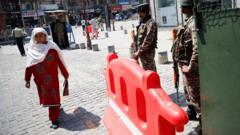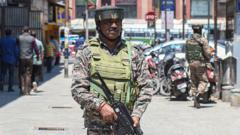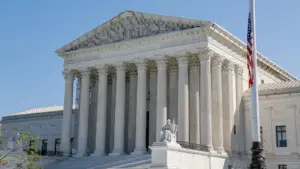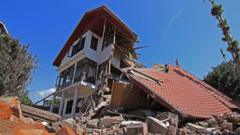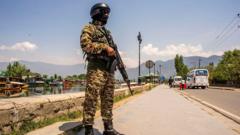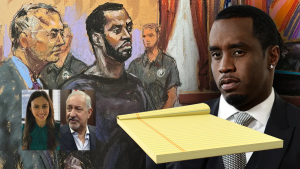As India's Supreme Court takes on petitions challenging the Places of Worship Act, concerns grow over potential religious discord, particularly between Hindu and Muslim communities amid historical grievances and modern legal challenges.
India's Places of Worship Law Faces Legal Scrutiny Amidst Rising Tensions
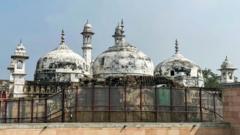
India's Places of Worship Law Faces Legal Scrutiny Amidst Rising Tensions
The Supreme Court's examination of the Places of Worship law could reshape the landscape of religious disputes in India.
The Gyanvapi mosque in Varanasi remains at the heart of a significant legal battle as India's Supreme Court hears petitions that challenge the foundational Places of Worship Act of 1991. This legislation preserves the character of religious sites as they existed at the time of India's independence in 1947. Under this law, converting or altering the designation of any place of worship is prohibited, effectively preventing judicial disputes regarding their status, except for the notable Babri Masjid case.
The Babri Masjid, a mosque from the 16th century, has been a source of contention since its demolition by a Hindu mob in 1992, which led to widespread riots and a sharp increase in communal tensions. In recent years, a court ruling awarded the Babri site for temple construction, further intensifying debates on religious identity and secularism in India.
Recent petitions, including one from a member of Prime Minister Narendra Modi's Bharatiya Janata Party (BJP), argue that the 1991 Act impinges upon religious freedom and constitutional secularism. This comes as Hindu groups have started challenging the ownership of various mosques, arguing that many were built on demolished Hindu temples. Critics, including opposition leaders and Muslim organizations, argue that reversing or weakening the law could lead to a cascade of similar challenges and heightened tension between communities.
In a recent development, the Supreme Court temporarily halted new challenges to the ownership of religious sites, with the next hearing scheduled for February. India's laws define that the religious characteristics of any worship place must be preserved as they stood on August 15, 1947, aiming to avert the violent intolerance experienced during partition.
The Places of Worship Act was introduced by the Congress government during a period of escalating tensions surrounding the construction of the Ram Temple at the Babri Masjid site. Stating the law's purpose in parliament, then Home Minister SB Chavan highlighted a rise in intolerance, warning against the potential exploitation of religious sentiments for political gains. In contrast, the opposition, particularly the BJP, criticized the law as appeasement towards minorities, fearing it would deepen divisions between Hindus and Muslims.
Significant cases concerning iconic mosques, including Gyanvapi and Shahi Eidgah, are anticipated to determine the fate of contested religious sites moving forward. A recent case in Rajasthan, claiming the Ajmer Sharif dargah was built over a temple, and violent clashes in Sambhal over mosque surveys showcase the ongoing friction related to the Act's implications.
The Supreme Court's future rulings on the Places of Worship law are poised to set essential precedents, either reinforcing legal protections or opening the door to further disputes. As these proceedings unfold, the concerns raised by critics regarding inter-religious tensions and potential fallout remain pressing. The Court's recent decision to pause surveys and legal actions on disputed worship places will provide temporary relief, but the specter of communal strife looms large as the hearings continue.
The Babri Masjid, a mosque from the 16th century, has been a source of contention since its demolition by a Hindu mob in 1992, which led to widespread riots and a sharp increase in communal tensions. In recent years, a court ruling awarded the Babri site for temple construction, further intensifying debates on religious identity and secularism in India.
Recent petitions, including one from a member of Prime Minister Narendra Modi's Bharatiya Janata Party (BJP), argue that the 1991 Act impinges upon religious freedom and constitutional secularism. This comes as Hindu groups have started challenging the ownership of various mosques, arguing that many were built on demolished Hindu temples. Critics, including opposition leaders and Muslim organizations, argue that reversing or weakening the law could lead to a cascade of similar challenges and heightened tension between communities.
In a recent development, the Supreme Court temporarily halted new challenges to the ownership of religious sites, with the next hearing scheduled for February. India's laws define that the religious characteristics of any worship place must be preserved as they stood on August 15, 1947, aiming to avert the violent intolerance experienced during partition.
The Places of Worship Act was introduced by the Congress government during a period of escalating tensions surrounding the construction of the Ram Temple at the Babri Masjid site. Stating the law's purpose in parliament, then Home Minister SB Chavan highlighted a rise in intolerance, warning against the potential exploitation of religious sentiments for political gains. In contrast, the opposition, particularly the BJP, criticized the law as appeasement towards minorities, fearing it would deepen divisions between Hindus and Muslims.
Significant cases concerning iconic mosques, including Gyanvapi and Shahi Eidgah, are anticipated to determine the fate of contested religious sites moving forward. A recent case in Rajasthan, claiming the Ajmer Sharif dargah was built over a temple, and violent clashes in Sambhal over mosque surveys showcase the ongoing friction related to the Act's implications.
The Supreme Court's future rulings on the Places of Worship law are poised to set essential precedents, either reinforcing legal protections or opening the door to further disputes. As these proceedings unfold, the concerns raised by critics regarding inter-religious tensions and potential fallout remain pressing. The Court's recent decision to pause surveys and legal actions on disputed worship places will provide temporary relief, but the specter of communal strife looms large as the hearings continue.


